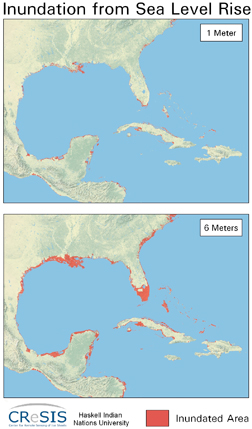|
|
The melting of the West Antarctic Ice Sheet could cause sea level to rise more than previously predicted for some regions, including the U.S. coastline, report researchers writing in the journal Science.
Jerry Mitrovica and colleagues argue that the Intergovernmental Panel on Climate Change’s (IPCC) assumption in its fourth assessment report that sea levels will rise uniformly around the world is wrong due to gravitational forces between ice sheets and the ocean. A summary from Science explains:
-
The authors show theoretically that sea-level rise would be higher in the oceans bordering North America and in the Indian Ocean than it would be in the rest of the world. This difference would arise largely because an ice sheet exerts a gravitational attraction on the nearby ocean and thus draws water toward it. If the ice sheet melts and the attraction subsides, sea level will actually fall within 2,000 kilometers of the collapsing ice sheet and progressively increase as one moves further from this region. Each ice reservoir will therefore produce a distinct fingerprint of sea level change. Taking Washington D.C. as an example, the authors predict an additional sea-level rise of 1.3 meters, on top of the previously estimated 5 meters.
 Sea Level Rise Maps from the Center for Remote Sensing of Ice Sheets (CReSIS) for 1-meter and 6-meter increases in sea level. |
“There is widespread concern that the West Antarctic Ice Sheet may be prone to collapse, resulting in a rise in global sea levels,” said Mitrovica, a geophysicist at the University of Toronto.
“We’ve been able to calculate that not only will the rise in sea levels at most coastal sites be significantly higher than previously expected, but that the sea-level change will be highly variable around the globe,” added co-author Natalya Gomez, a physics graduate student at the University of Toronto.
“The net effect of all of these processes is that if the West Antarctic Ice Sheet collapses, the rise in sea levels around many coastal regions will be as much as 25 per cent more than expected, for a total of between six and seven meters if the whole ice sheet melts,” said Mitrovica. “That’s a lot of additional water, particularly around such highly populated areas as Washington, D.C., New York City, and the California coastline.”
Peter Clark, a professor of geosciences at Oregon State University and co-author of the study, said this gravitational effect has been know for at least 30 years “but for some reason it became virtually ignored.”
“People forgot about it when developing their sea level projections for the future,” he added.
The authors say that while it is still unclear how much of the West Antarctic Ice Sheet will collapse over the next century, it is important to factor this gravitational effect into any projections on sea level rise.
“These same effects apply to any amount of melting that may occur from West Antarctica,” Clark said. “So many coastal areas need to plan for greater sea level rise than they may have expected.”
“There is still some important debate as to how much ice would actually disappear if the West Antarctic Ice sheet collapses – some fraction of the ice sheet may remain quite stable,” added Mitrovica. “But, whatever happens, our work shows that the sea-level rise that would occur at many populated coastal sites would be much larger than one would estimate by simply distributing the meltwater evenly. Any careful assessment of the sea-level hazard associated with the loss of major ice reservoirs must, of course, account for the sea-level fingerprint of other sources of meltwater, namely Greenland, the East Antarctic and mountain glaciers. The most important lesson is that scientists and policy makers should focus on projections that avoid simplistic assumptions.”
CITATION: J.X. Mitrovica, N. Gomez, & P.U. Clark. The Sea-Level Fingerprint of West Antarctic Collapse. SCIENCE 6 FEB 2009